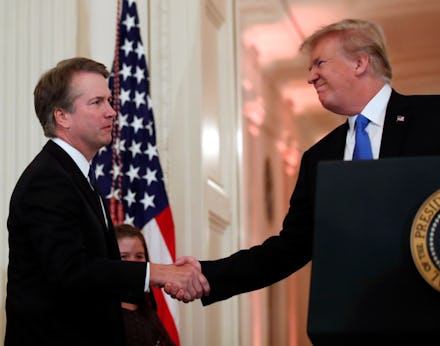How Trump’s Supreme Court pick could play a pivotal role in Russia probe cases

President Donald Trump could seal a conservative majority on the Supreme Court for decades to come, now that he has tapped Brett Kavanaugh to replace retiring Associate Justice Anthony Kennedy — and with his pick, he could gain a key ally on the nation’s high court as the rubber begins to meet the road in the Russia investigation.
If confirmed, Kavanaugh could eventually have to answer numerous thorny legal questions that could strike at the heart of the probe. This includes whether Trump should be required by law to testify before the special counsel, whether a sitting president can be indicted for a crime and whether it’s within Trump’s authority to pardon himself if charged.
No legal cases relating to these questions are yet running up the courts. The next Supreme Court session is in October, though, meaning that Kavanaugh could potentially be seated by the time any of these potential cases emerge.
Based on some of Kavanaugh’s past writings, top Democrats are concerned that he was chosen for “political” reasons, and therefore could give legal cover to the president in potential court battles with special counsel Robert Mueller, who is leading the investigation.
“[Trump] sees the courts as an extension of his power, not a check on it,” Sen. Patrick Leahy (D-Vt.), a ranking member of the Senate Judiciary Committee, said in a statement Monday. “Judge Kavanaugh’s record reveals an endorsement of this expansive view of presidential power — views that ultimately may place the president above the law.”
Kavanaugh wrote in a 2009 article for the Minnesota Law Review that presidents “should be excused from some of the burdens of ordinary citizenship while serving in office.” This view came after his experience as a top investigator into President Bill Clinton in the 1990s, and as an official in George W. Bush’s administration in the 2000s.
“Having seen first-hand how complex and difficult [the job of a president] is, I believe it vital that the president be able to focus on his never-ending tasks with as few distractions as possible,” Kavanaugh wrote. He argued that Congress should enact a law exempting presidents from civil suits and criminal investigations while in office.
“Deferral would allow the president to focus on the vital duties he was elected to perform,” Kavanaugh argued. “A president who is concerned about an ongoing criminal investigation is almost inevitably going to do a worse job as president.”
That would seem to put him in line with Trump, who has argued that the Mueller investigation is a “distraction” and a politically-motivated “witch hunt.” The Trump campaign has been under investigation for over a year because of its alleged ties to Russia. Trump has also been under investigation for potential obstruction of justice on his part.
Trump and his allies have repeatedly sought to undermine the probe. His legal team has indicated it may attempt to prevent Mueller from interviewing Trump, and he’s railed against his investigators and has indicated he believes members of his administration should protect him from the probe. This is all while the president insists there was no collusion or obstruction, and has also claimed he has the “absolute right to PARDON” himself.
With the special counsel reportedly preparing to wrap up all or part of the investigation this year, Mueller and Trump could be on a collision course — something that could require the Supreme Court to settle some high-profile disputes.
Kavanaugh’s writing on presidential exemptions from civil suits and criminal probes suggests a broad view of presidential power — a position Trump’s team has reviewed, according to CNN.
Kavanaugh, 53, is Trump’s second pick to the Supreme Court — and, like his first pick of Neil Gorsuch, the nominee is young and conservative, coming from a list of 25 names that have been vetted for Trump by the conservative Federalist Society.
His nomination has been slammed by Democrats as a threat to civil rights, Roe v. Wade and the Affordable Care Act — and party leadership appears to be digging in for what is shaping up to be a contentious confirmation fight.
He’s still expected to be confirmed, however — which could trigger calls from Democrats to step away from rulings related to the Mueller probe.
“My colleagues should join me in demanding that if Judge Kavanaugh becomes Justice Kavanaugh he will recuse himself from cases that appear almost certain to come before the Court [related to the Russia probe],” Sen. Richard Blumenthal (D-Conn.) said in a statement Monday. “If our country is to remain a nation of laws — where no one is above the law — we cannot allow the president to appoint a Supreme Court swing vote to insulate himself from accountability for criminality and wrongdoing.”